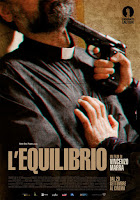What
is the proper role for a priest? Should he fight for justice or maintain the
balance of power, like a 1970s State Department bureaucrat, who read too much
Bismarck? It seems like a no-brainer in theory, but would you be tempted to opt
for stability, if you had to chose in the real world? Don Giuseppe will make
his choice and his parishioners will make theirs when he is transferred to his
native Campania in Vincenzo Marra’s Equilibrium
(trailer
here),
which screens during Open Roads: New Italian Cinema 2018.
Don
Giuseppe has always been actively engaged in the world. He did life-altering
missionary work in Africa and he has steadfastly ministered to the illegal aliens
congregated at a migrant shelter in Rome. Frankly, he is concerned he could
become a little too engaged when a social worker admits her romantic feelings
for him. To preserve his calling, Don Giuseppe requests and is granted a
transfer to a blighted district just north of Naples.
When
the good father first meets Don Antonio, whom he will succeed, the veteran
cleric seems to be quite the crusader himself through his campaign against the
illegal noxious waste dumping in the hills above town. However, it soon becomes
clear this is cheap activism, since nobody claims responsibility for the
dumping and everyone generally agrees it is a less than ideal practice.
However, when it comes to standing up for the vulnerable in the community, Don
Antonio is much more circumspect.
Frankly,
Don Antonio has done his best to intimidate the isolated Assunta into accepting
her boyfriend’s sexual abuse of her daughter. Unfortunately, she happens to
live in the housing project that is the center of the local drug dealers’
transactions. Having the cops pay a visit would be bad for business. For the
sake of peace in the valley, Don Antonio is willing to sacrifice Assunta and
her daughter—and the cops and dealers are right there with him. However, Don Giuseppe
will not play that game.
Equilibrium is a deeply moving
film that challenges what faith really means and how it should be manifested in
the real world. Marra filmed docu-style, employing many street level
long-takes. He recruited many non-professional actors from the region, scoring
a double jackpot with Mimmo Borrelli and Roberto del Gaudio, who are both
tremendous as Don Giuseppe and Don Antonio, respectively. Borrelli is a quiet
marvel, expressing so much questioned faith and Christian love through subtle
and restrained looks and gestures. In contrast, del Gaudio is flamboyantly
charismatic and chillingly Machiavellian. Astrid Meloni, one of the few
professional ringers, adds further layers of compelling human messiness as Veronica,
Don Giuseppe’s source of temptation.
It
is impossible to watch Equilibrium without
hearing echoes of the Catholic Church’s sex abuse scandals. It is easy to damn
in retrospect, but the film clearly challenges viewers to ask what they would
have done if they were cops, social workers, or lay leaders trying to hold
their communities together. Throughout the film, Marra shows in concrete terms why
ostensibly responsible people often opt for stability over moral principle,
while never endorsing or excusing their expediency. It is a tough, powerful
film. Very highly recommended, Equilibrium
screens tomorrow (6/3) and Wednesday (6/6) at the Walter Reade as part of
this year’s Open Roads.









